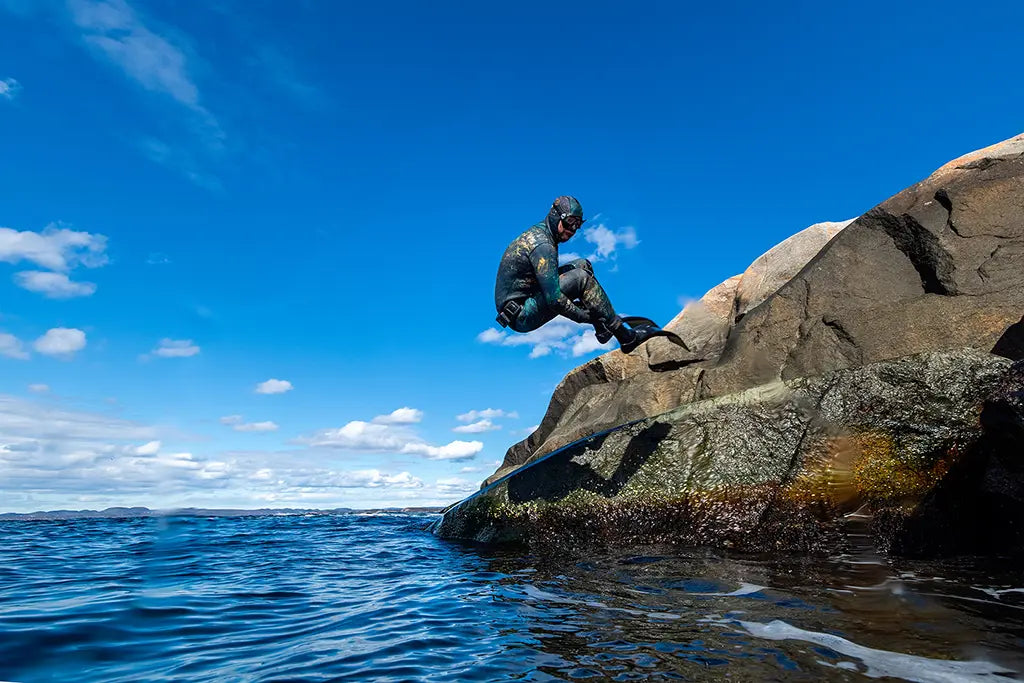
Photo: Aleksander Nordahl, ettpust.com
To free dive and hunt underwater in Norway and other places where the sea gets cold in winter, you need your own suits that are specially made for this. Wetsuits for freediving are flexible and are applied with warm water (bring a thermos) with added skin-friendly soap or the application agent Slippy .

The main qualities of a freediving suit are:
• Neoprene without nylon on the inside ("Open cell")
• At least 7mm thickness for year-round use
• Two-piece wetsuit with trousers and top
• Must be rinsed inside with soapy water before putting them on
3-5mm = summer suits 7mm = year-round suits
9mm = winter suits or year-round suits if you live far north
Open cell means that the neoprene from which the suit is made is not coated with nylon or other materials inside. Neoprene has very high friction, so you must rinse the inside of the suit with soapy water before putting it on.
Avoid water sports suits or wetsuits with nylon on the inside. These are well suited for water sports and snorkelling , but because they let water in they quickly become cool, and since you are looking for calm and a low heart rate when freediving and underwater hunting, keeping warm is very important.
Some freediving suits do not have nylon on the outside, but only consist of neoprene that has been surface treated so that it has a smooth surface. These are referred to as the "Smoothskin" type. This provides a good fit and softness. The disadvantage is that these suits must be put on and taken off with greater care, and are therefore only recommended for experienced freedivers who have a good technique for taking off and putting on wetsuits.
In recent years, suits with highly elastic nylon have come on the market. These are as flexible as smoothskin suits, and thus preferable for most people.
In the picture below, you see Vidar Holmen with a smoothskin suit during the WC in Turkey in 2022. Apnea athletes usually use smoothskin wetsuits.

Vidar Holmen during the WC in 2022
The open cell suits are tight-fitting and retain the heat very well. They are most often supplied with nylon on the outside to strengthen the suit against tears and wear. For most people, it will be fine to wear a 7mm suit all year round. If you have good advice, it is also possible to invest in a 5 mm suit in the summer and a 9 mm suit in the winter.
Some suits have shoulder braces on the trousers (long john), while others have trousers that stop above the navel level. The first option is preferred by some, but here the disadvantage is that you have to take off the entire top if you have to go to the toilet during the dive. The latter option is therefore often preferable when you have to spend hours in the sea.
It is important that a freediving suit for cold water has a good fit on the hood. There should be no gap/gap between the edge of the hood at the forehead and the mask, otherwise you can quickly contract a sinus infection on winter and spring dives. With a good fit, you are also better protected against stinging nettles.
It is not recommended to urinate in the suit. For some, it can lead to skin eczema, or the smell "settles" in the suit. Take a trip on land instead.
Apart from this, the most common open-cell suits on the market are relatively uniform and of good quality , but some suits are much more flexible and comfortable to move in than others, and the wear resistance of the neoprene varies somewhat. Differences in these qualities are usually reflected in price.
To keep warm
How well you keep warm varies a lot, influenced by both metabolism, physique and other conditions. To keep warm better when it's really cold in the sea, you can wear a singlet under the suit or replace the gloves with mittens . Thicker socks are also an option, but then you have to have roomy fins.
Products for the cold season
The disadvantage of thicker suits is that they become a little stiffer to move in, but with a new generation of suits they are significantly softer than before. Thick suits give you more buoyancy and then you need more lead. It is also important that the suits fit well and are tight-fitting, so that water does not circulate between the suit and the body, which causes heat loss. People who are growing should change their clothes often.
See all:
Summer suits (3-5mm)
All-year suits (7mm)
Winter suits (9mm)
Insulation garment
Mittens and gloves
Socks


